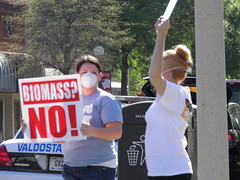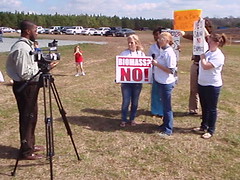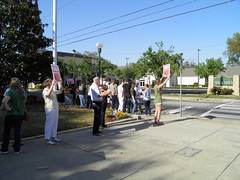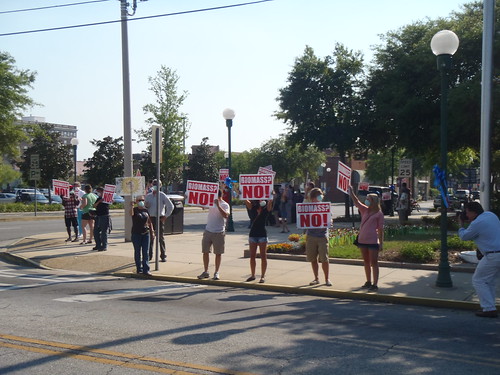Category Archives: Planning
When the biomass plant is cancelled —John S. Quarterman
 I applaud the activism of
the many and varied biomass opponents!
Let me repeat my prediction: the biomass plant will never be built.
That’s no reason to stop doing what you’re doing.
You know opposition is having an effect when
VLCIA repeatedly denies it.
I applaud the activism of
the many and varied biomass opponents!
Let me repeat my prediction: the biomass plant will never be built.
That’s no reason to stop doing what you’re doing.
You know opposition is having an effect when
VLCIA repeatedly denies it.
You might be surprised how many other people think this plant will never be built. Ashley Paulk told me Continue reading
Let’s see these “many” biomass opponents
-
 at the 23 February 2011 Wiregrass Solar groundbreaking:
“Biomass no, solar yes” —Kathryn Grant
at the 23 February 2011 Wiregrass Solar groundbreaking:
“Biomass no, solar yes” —Kathryn Grant
-
 at the
15 March 2011 VLCIA board meeting:
“We’re here to protest against biomass. We wish Brad Lofton well in his new job, but we want biomass to go as well.” —Michael Noll
at the
15 March 2011 VLCIA board meeting:
“We’re here to protest against biomass. We wish Brad Lofton well in his new job, but we want biomass to go as well.” —Michael Noll
-
 at the
24 March 2011 Valdosta City Council meeting.
“Ban the Burn; Go 100% Solar” —Jack Pruden
at the
24 March 2011 Valdosta City Council meeting.
“Ban the Burn; Go 100% Solar” —Jack Pruden
My opinion is the same as I posted last month: “Black and white, young and old, conservative and liberal, college professors and unemployed”. Come see for yourself today outside Valdosta City Hall starting at 5PM.
-jsq
Jails Reap Millions Off U.S. Illegal Alien Crackdown
She goes on to mention CCA’s stock price has gone up by a factor of ten since 9/11.The big winner in the crackdown on the illegal immiggration has been the private prison industry. As Bloomberg Business Week reports in its latest issue, companies such as Corrections Corporation of America are making millions. In fact, CCA makes more money from detaining immigrants than it does from any single U.S. state.
The source of the money CCA and its investors and executives are making? Our tax dollars!
With all the additional jail time, misdemeanors, and felonies in new state laws such as Arizona’s, states could catch up with the feds in paying CCA through the nose!
-jsq
Meanwhile in Dublin and Laurens County, Georgia
 Jerome Tucker
mentioned that it was
Willie Paulk who enticed MAGE SOLAR
to Dublin and Laurens County, Georgia.
She’s
president of the Dublin Laurens County Chamber of Commerce.
Here’s
a writeup in GeorgiaTrend
about what’s going on there.
Jerome Tucker
mentioned that it was
Willie Paulk who enticed MAGE SOLAR
to Dublin and Laurens County, Georgia.
She’s
president of the Dublin Laurens County Chamber of Commerce.
Here’s
a writeup in GeorgiaTrend
about what’s going on there.
Hm, instead of taking out $15 million in bonds to be paid back by the taxpayers, the community around Dublin joined together and made available just as much money: Continue reading
T-SPLOST Explained —Corey Hull of VLMPO at LCDP (Part 1)
You’ve heard Corey Hull of the Valdosta-Lowndes County Metropolitan Planning Organization (VLMPO) give a brief version of T-SPLOST at VLCIA. Here he talks at greater length at the Lowndes County Democratic Party:
So who are these regional commissions? Continue readingThe Georgia legislature passed what was then known as House bill 277 called Transportation Investment Act of 2010…. It created or proposed a one percent sales tax for transportation purposes throughout the state of Georgia. It creates twelve special transportation taxing districts that are based on the boundaries of the regional commissions. And that is where the connection with the regional commission stops. They are not the same body….
VDT says VLCIA illegally made up a document
Presumably that would be the “Project Critical Path time-line is attached” that wasn’t actually attached to documents returned for an open records request of 17 February 2011. Hm, since VLCIA did supply such a document to the VDT, presumably it is now a VLCIA document subject to open records request, even though it was not what VLCIA told VDT it was.The reporter who conducted the interview with Industrial Authority Project Manager Allen Ricketts has been subsequently repeatedly contacted by Ricketts for what he deems “false reporting.” According to Ricketts, the timeline was never official and was only something the Industrial Authority threw together to appease the Times when given an official Open Records Request. Ricketts is apparently unaware that legally he cannot produce a document that does not exist to comply with said request. If he knowingly did so, as he now claims, that is a clear violation of the Open Records Act.
Back to the VDT editorial: Continue reading
T-SPLOST explained by Corey Hull and Ashley Paulk, tonight, LCDP

Come hear Chairman Ashley Paulk and MPO Director Cory Hull give us information about T-SPLOST. The special local option tax for Transportation.Ashley Paulk is Chairman of the Lowndes County Commission.
 Corey Hull is Coordinator for the
Valdosta-Lowndes County Metropolitan Planning Organization (VLMPO).
Corey Hull is Coordinator for the
Valdosta-Lowndes County Metropolitan Planning Organization (VLMPO).
So you’ll have some idea what to expect, here’s Corey Hull’s explanation of T-SPLOST to VLCIA in February.
 Here’s a very interesting
question by Norman Bennett at that same meeting.
Here’s a very interesting
question by Norman Bennett at that same meeting.
You can come ask questions tonight!
-jsq
Lame-duck Lofton cranks the same old scratched wax cylinder
Date: Fri, 25 Mar 2011 08:59:49 -0400Continue readingJames:
Thanks so much for sharing this and for your continued strong support of our client’s green renewable energy project. In addition to assisting the country in reducing our consumption of middle eastern fuel and improving the environment, this project will provide a much needed economic impact for landowners of every race, and the Industrial Authority will assist in the efforts underway to assist local farmers. Google “benefits of biomass electricity,”

© BrokenSphere / Wikimedia Commons.
Valdostans protest biomass –VSU Spectator
 Molly Duet
writes in the VSU newspaper today:
Molly Duet
writes in the VSU newspaper today:
Protestors wearing respirator masks held signs reading “Biomass? No!” in front of the Valdosta City Hall building on Thursday. Members of the Wiregrass Activists for Clean Energy, the VSU student organization Students Against Violating the Environment, and other concerned Valdosta citizens showed up to protest the construction of the Wiregrass Power: Biomass Electric Generating Plant.The Spectator article quotes from two speakers for whom LAKE happens to have video, linked below. Continue reading“We already have solar power resources in place that we could be using and I feel like money should be directed towards that,” Ivey Roubique, vice-president of the Student Geological Society, said. “It wouldn’t be good for the community and even though I’m in college here it still matters.”
